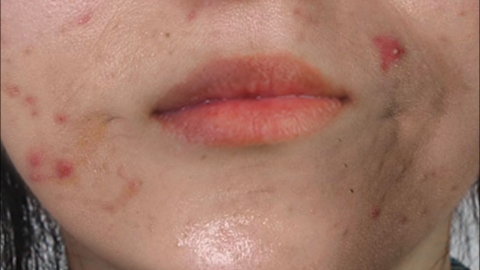How to manage acne caused by hormonal imbalance
Acne usually refers to acne vulgaris. Generally, endocrine disorders leading to acne may be caused by factors such as hormonal fluctuations during puberty, excessive emotional stress, hyperthyroidism, polycystic ovary syndrome, and hyperprolactinemia. It is recommended to seek timely medical consultation to identify the underlying cause and, under a doctor's guidance, regulate the condition through general treatment, medication, or surgical treatment. Specific explanations are as follows:

1. Hormonal fluctuations during puberty: Increased androgen secretion during puberty stimulates excessive sebum production by sebaceous glands, leading to clogged pores and acne, commonly appearing on the forehead and cheeks. Cleanse the skin daily with warm water, avoid frequent use of irritating skincare products, reduce intake of high-sugar and fried foods, and ensure adequate sleep. Acne may gradually improve with age.
2. Excessive emotional stress: Prolonged mental tension increases adrenal hormone secretion, disrupting endocrine balance and promoting acne formation, often accompanied by irritability and insomnia. Set aside time daily for relaxing activities such as deep breathing or jogging, avoid staying up late, relieve stress through communication with others, and reduce the impact of hormonal fluctuations on the skin.
3. Hyperthyroidism: Excessive secretion of thyroid hormones affects metabolism, causing abnormal sebum production and triggering acne, accompanied by palpitations and excessive sweating. Patients should follow medical advice to take medications such as methimazole tablets, propylthiouracil tablets, or propranolol tablets to manage the condition.
4. Polycystic ovary syndrome: Excessively high androgen levels lead to excessive sebum secretion, causing persistent acne, along with hirsutism and menstrual irregularities. Patients should follow medical advice to take medications such as ethinylestradiol cyproterone tablets, spironolactone tablets, or dydrogesterone tablets to regulate hormone levels. Engage in aerobic exercise more than three times per week and manage weight to improve symptoms.
5. Hyperprolactinemia: Elevated prolactin levels disrupt hormonal balance, causing acne, possibly accompanied by galactorrhea and menstrual disorders. If caused by a pituitary microadenoma, transsphenoidal pituitary tumor resection can be performed to remove the tumor and reduce prolactin levels.
Daily care should include a light diet, reducing intake of spicy and sweet foods, and increasing consumption of vegetables, fruits, and whole grains. Maintain a regular lifestyle, avoid staying up late, and ensure sufficient sleep. Keep the skin clean, use mild facial cleansers, avoid frequently squeezing acne lesions to prevent infections and scarring, and help improve overall skin condition.







